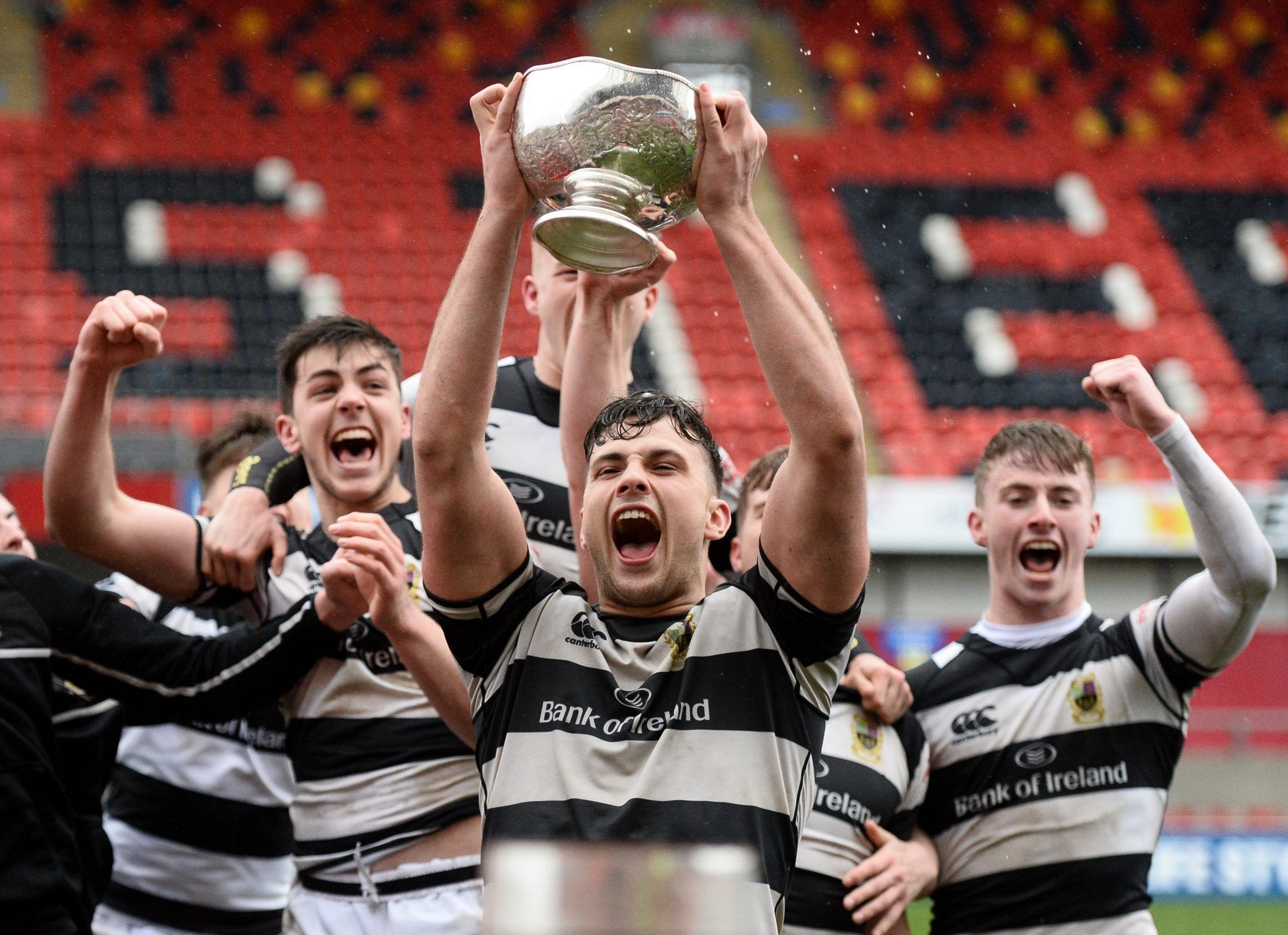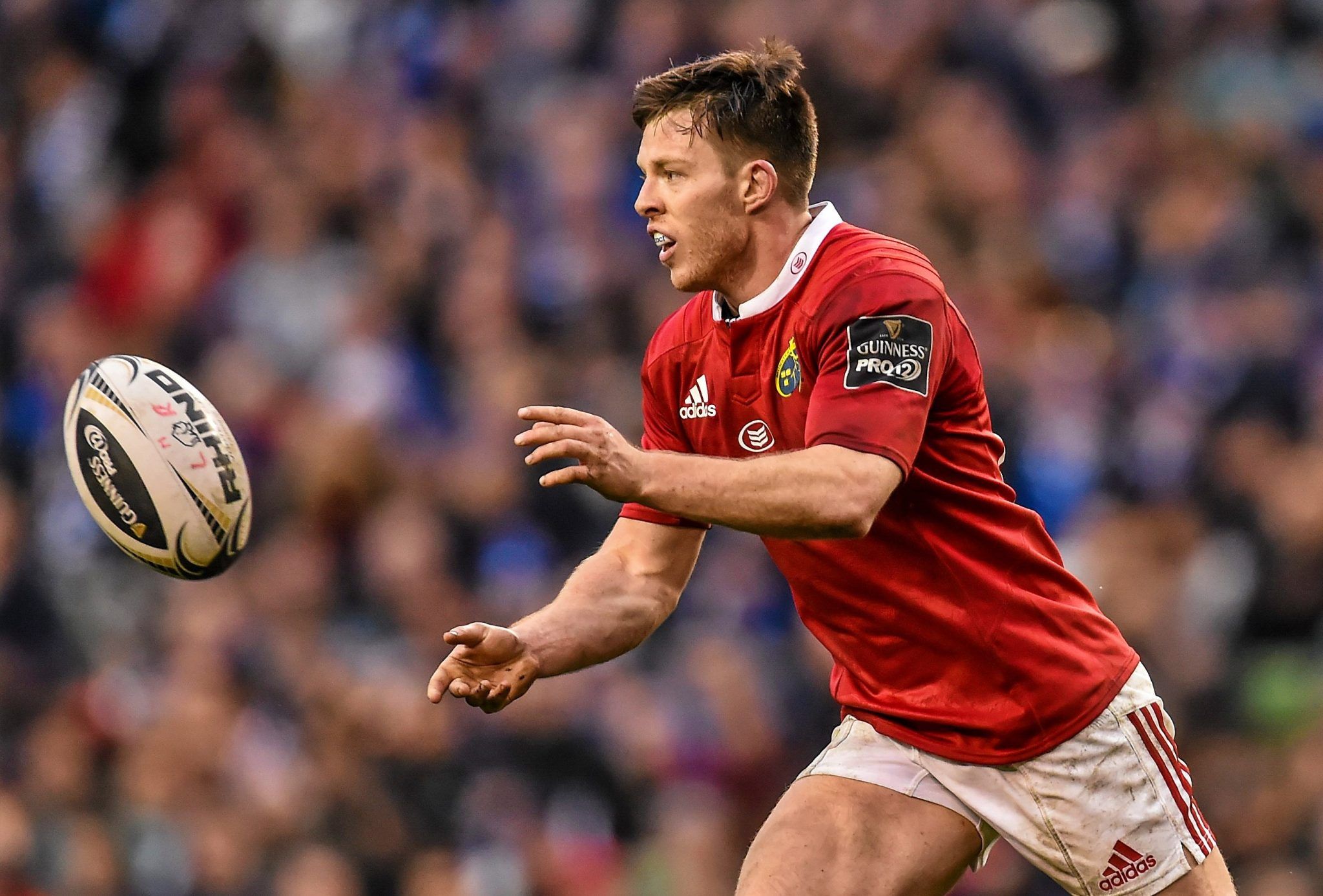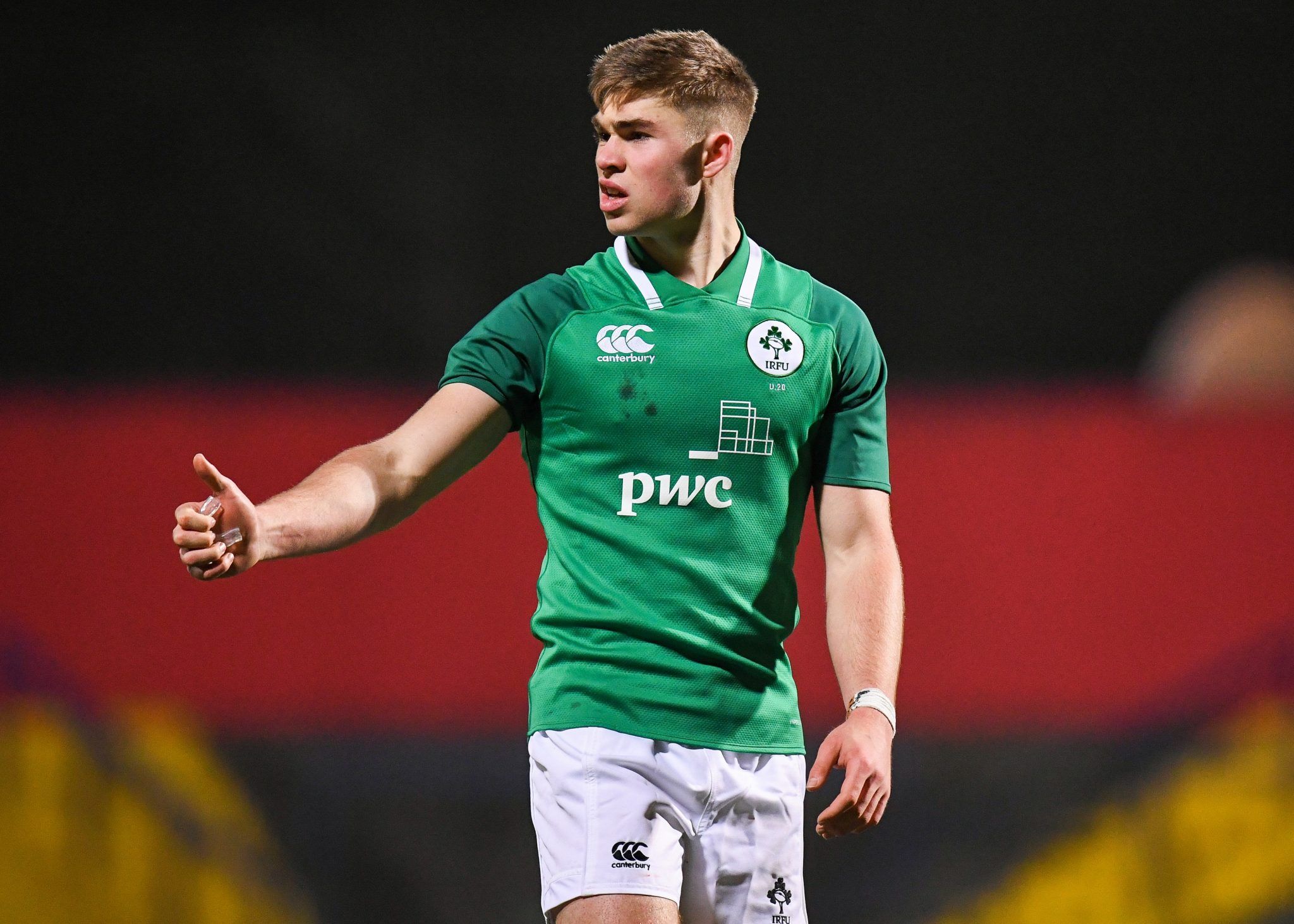

Share
6th February 2020
05:32pm GMT

"Bishopstown was a great place to live and a great place to grow up. Then, sure, as time went on, you had Denis Irwin and Sonia O’Sullivan and you had Roy Keane, and they’re on your door-step. You had Jimmy Barry Murphy and Davey Barry, all these guys that were heroes on your door-step. Michael Bradley, Ralph Keyes, Donal Lenihan from rugby."
 O'Gara followed in the steps of Keyes and Bradley by attending Presentation. It was there that he struck up a half-back partnership with Stringer and went on to captain the school to Munster senior cup glory.
Don Buckley points out the pair in the same team photo that contained the Pres juniors that won their cup competition that year too. Arms folded and proud as punch, in that same photo, is Declan Kidney, who would go on to coach Munster to two European Cups and Ireland to Grand Slam success in 2009.
Buckley has been involved at PBC as a teach and coach for over two decades. He took a step back from the coaching when his own children were young but is back now and on a coaching ticket with Ger Burke and former Munster player Cian Bohane. We meet him on the morning of a Munster Schools Cup game against Limerick's Crescent College [they would go on to win 21-8] and the school is gearing up for a big day.
O'Gara followed in the steps of Keyes and Bradley by attending Presentation. It was there that he struck up a half-back partnership with Stringer and went on to captain the school to Munster senior cup glory.
Don Buckley points out the pair in the same team photo that contained the Pres juniors that won their cup competition that year too. Arms folded and proud as punch, in that same photo, is Declan Kidney, who would go on to coach Munster to two European Cups and Ireland to Grand Slam success in 2009.
Buckley has been involved at PBC as a teach and coach for over two decades. He took a step back from the coaching when his own children were young but is back now and on a coaching ticket with Ger Burke and former Munster player Cian Bohane. We meet him on the morning of a Munster Schools Cup game against Limerick's Crescent College [they would go on to win 21-8] and the school is gearing up for a big day.
"Tradition is a massive thing in this school, as it would be in most rugby schools in this province, but listen, you only have to look at the walls around here to see former greats, you know, Lions captains, Tom Kiernan, Jerry Walsh, people who have gone on to greater things. "Michael Kiernan, who was just inducted into the Rugby Hall of Fame. Michael is a past pupil. His son, Paul, was a magnificent player for us a few years ago – senior captain and Under 20s international. So it tends to run in families as well, you know, fathers, sons, grandfathers. We had one there a few years ago with Michael Bradley and his father, who has sadly passed away now. But his son Gary would have won a senior cup in 2017. Grandfather, father and son would have all won senior cups in Pres, so it’s a very, very unique photograph."PBC and Christian Brothers Cork, up on the hill, have long battled for supremacy in the city, and county. It can often be easy to focus on those close rivalries but the past five to 10 years has seen a host of Dublin schools lauded for producing player after player for the senior Leinster and Ireland set-ups. McNamara's Ireland U20 squad has 20 Leinster players with the likes of Clongowes, Blackrock and St Michael's all well represented. In terms of results, with PBC meet Dublin sides on the pitch, it is fairly even. In terms of resources, the Dublin schools are on another plane.
"It's not secret that we would love to have our own 4G [all-weather] pitch here. It's one of the enviable things when you go to the likes of Michael's and St Mary's and Terenure, who have new facilities. That's something that we would envy, facilities like that for training, particularly with the weather we've had over the last while. It's been challenging, to say the least."When the statistic of just three Cork players across the senior and U20s squads is brought up, Buckley is firm in his belief that the talent is there. He is the first (but he will not be the last) to say that the current state of affairs is "cyclical" and rightly points out that most of Munster Rugby's latest round of senior contracts went to Cork players. [caption id="attachment_209498" align="aligncenter" width="2048"]
 PBC captain (and current Munster player) Jack O'Sullivan lifts the Munster Schools Senior Cup in 2017. (Photo by Diarmuid Greene/Sportsfile)[/caption]
What Buckley would like to see, however, is the blooding of young players at a much earlier juncture. Leinster garner much praise for doing so but, some would argue, it is easier to drop youngsters into a winning team rather than one scrapping for every point they can get.
PBC captain (and current Munster player) Jack O'Sullivan lifts the Munster Schools Senior Cup in 2017. (Photo by Diarmuid Greene/Sportsfile)[/caption]
What Buckley would like to see, however, is the blooding of young players at a much earlier juncture. Leinster garner much praise for doing so but, some would argue, it is easier to drop youngsters into a winning team rather than one scrapping for every point they can get.
"I think one of the beauties about the Leinster system," says Buckley, "since Stuart Lancaster came in, is that young fellas are getting their head. The likes of Ronan Kelleher, Caelan Doris. They are guys who have been identified early and just, ‘Lads, work away’. And given their chance and [have] taken it. No-one can dispute their suitability for the international game, those two guys. "If you contrast that with one of our past players Jack O’Sullivan, who’s at the same level, or the same age-group of Caelan Doris, for example, Jack is only finding his way now in the Munster scene. I think if he was in Leinster – and it might be a controversial point of view now – if he was in Leinster, he would be already blooded in Heineken Cup, and ambition that Jack only realised a few weeks ago. Certainly there are young Munster players that should be given their chance earlier.""Other guys have come through in the mean-time," the long-time coach adds. "The likes of Jonathan Wren and Sean French and Billy Scannell, who have gone on to play for Munster 20s, and Shane Daly as well, who I mentioned earlier. So, listen, there’s a good pedigree of kid coming through."
"The teams I used to follow," he says, "they were like superhuman almost. You used to say to yourself, ‘I’ll never end up like that but I enjoy playing it so I’ll stick at it’." "I used to hang around all week, waiting for the Saturday to spend it in Con... The teams back then playing for Con, nearly all of them went on to play provincial or for Ireland."Johnny Holland welcomes us into the clubhouse of Cork Constitution, up on Temple Hill. As reigning Munster Senior Cup and All-Ireland champions, there is lots of silverware on show while the jerseys of Kiernan, Keyes, Lenihan, O'Gara, O'Mahony and more adorn the walls. Out the main window lies the main pitch that is well marshalled by the groundsman here and, beyond the trees, the Gaelic grounds at Páirc Uí Rinn. While Limerick is often dominated by rugby and hurling, Cork youngsters have the likes of football and soccer vying for their attentions too.
"Even when lads are growing up and coming out of school, it’s getting fairly competitive," says Holland, "because the way everyone is going to Dublin and elsewhere for work, and people going travelling; things like that. So, the playing pool in Cork isn’t massive when you compare it to Dublin... But, with Highfield top of Division 1B, UCC in Division and ourselves in 1A. I know Dolphin have dropped off but even with that, a couple of senior clubs, and the recruitment becomes competitive."
 Holland himself was recruited by Cork Con. He played his underage rugby at Sunday's Well before lining out for UCC. Con then tempted him to Temple Hill and he played five years with them while also making his way with Munster. Injuries forced him to retire from the professional game at 25 but he is enjoying the sport again as assistant coach with the senior team.
"There’s so much talent that comes out of Cork," he says. "It’s a big county and there’s obviously decent clubs here. I played in UCC and I’d have a lot of love for my time in UCC but, even at a club like this, there’s a lot of talent here. Just look at the walls.
Holland himself was recruited by Cork Con. He played his underage rugby at Sunday's Well before lining out for UCC. Con then tempted him to Temple Hill and he played five years with them while also making his way with Munster. Injuries forced him to retire from the professional game at 25 but he is enjoying the sport again as assistant coach with the senior team.
"There’s so much talent that comes out of Cork," he says. "It’s a big county and there’s obviously decent clubs here. I played in UCC and I’d have a lot of love for my time in UCC but, even at a club like this, there’s a lot of talent here. Just look at the walls.
"Munster Rugby wouldn’t be as prominent without Cork rugby as well, you know. It just has to stay alive. "Even Shane Daly, probably the hottest prospect coming through Cork at the moment will hopefully go on to a green jersey in the not too distant future. You know, so, if you alienate Cork, you alienate those guys too and it’d be a big loss."
"Munster, at the moment, are there or thereabouts but if they really want to be sustainable, they'll have to start producing more talent coming through. You do wonder where the fall-out is coming... it's good to see some players coming out of West Cork now but Munster need to find a way of creating a stronger conveyer-belt."When O'Sullivan notes the recent players emerging from West Cork, he surely has Bandon in mind. Bandon Grammar and Bandon Rugby Club teamed up a few years ago to get in French coach Regis Sonnes to help develop the club, and the next generation coming through the school. Sonnes is back at Toulouse now but the good work continues out West, with the likes of Darren Sweetnam, Gavin Coombes and Jack Crowley (pictured below) coming through in recent years.
 Johnny Holland concedes that Munster Rugby's move to a permanent base, up at University of Limerick, was for the best. Nonetheless, he wonders if the club not having that same presence in Cork that it used to has had a trickle-down effect. Whereas talented young players from Cork used to be able to attend college here and still train with the academy, some are having to travel back and forth each day. Munster moving away from their old Cork training centre would inevitably lead to the province having less eyes on the local Cork rugby scene too.
O'Sullivan would like to see Munster looking into the idea of using the game know-how and experience (Intellectual Property) of former players to help bring through the next generation.
"The guts of Munster rugby is the club game," he comments. "And this would be just my view, but I think they need to re-establish that visceral connection with the club game, in Munster, where it is still strong and thriving.
Johnny Holland concedes that Munster Rugby's move to a permanent base, up at University of Limerick, was for the best. Nonetheless, he wonders if the club not having that same presence in Cork that it used to has had a trickle-down effect. Whereas talented young players from Cork used to be able to attend college here and still train with the academy, some are having to travel back and forth each day. Munster moving away from their old Cork training centre would inevitably lead to the province having less eyes on the local Cork rugby scene too.
O'Sullivan would like to see Munster looking into the idea of using the game know-how and experience (Intellectual Property) of former players to help bring through the next generation.
"The guts of Munster rugby is the club game," he comments. "And this would be just my view, but I think they need to re-establish that visceral connection with the club game, in Munster, where it is still strong and thriving.
"For me, the way to go would be to reverse engineer it a bit. The guys that would be in the academies and that, starting out in their professional careers, they need to get back and play in their clubs regularly; as much as possible. Now, playing club rugby is not the same level as playing professionally but if you watch a good AIL match... I've watched those All-Ireland League finals and they are excellent games. "The club game can be the college of hard knocks that some of these young fellas need to cut their teeth. I'd love to see these lads back and getting game-time. Less time in the gym and more time on the field with their clubs."
"This place is built on stories," says Holland. "I was only talking to Kenny Murphy there at the weekend and he has only missed one AIL game in 13 years. That's unbelievable. He doesn't only tell you stories about his own career or his own international days. He'll tell you about the lads in Con, 10 years ago and further back. "There's stories alright. It doesn't have to be a Lions or an Irish trip. There's all sorts of tales in the bar anyway. People live for it here."
Explore more on these topics: